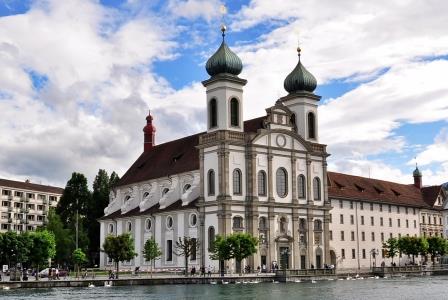
Bradley Palmer
The country of Switzerland (often called the Swiss Confederacy) is a federal republic made up of 26 cantons. The Roman Catholic Church was the dominant religious force in Switzerland from approximately 1000 AD when the Roman Empire took Switzerland from the French and approximately 1520 when the Protestant reformation took hold in some of the cantons beginning in Zurich.
The Cantons were split between Catholicism and Protestantism leading to a civil war that was won by the Catholic cantons in 1531. Another Catholic-Protestant conflict occurred in 1847. The Swiss constitution of 1848, written by the victorious pro-Union Protestant cantons, prohibited the Catholic Jesuits from occupying clerical or teaching positions and prohibited the building of monasteries and convents. This ban was not repealed until June 1973.
Direct democracy is a powerful force in Swiss politics. Citizens may challenge any law passed by the federal government through referendums or introduce amendments to the constitution through initiatives. The cantons also implement direct democracy. Since 1953, the federal government has been a coalition of the four major political parties: (1) the Social Democrats, (2) the Liberal Democrats, (3) the Swiss People’s Party and (4) the Christian Democrats.
Eighty percent of Swiss people consider themselves “religious” and 17.6% consider themselves “very religious.” As of the 2000 census, 41.8% of the population professed membership in the Roman Catholic Church, 35.3% in a Protestant denomination, 11% with no formal religious creed and 1.8% Christian Orthodox. A recent influx of immigrants from Bosnia-Herzegovina, Kosovo, Albania and Turkey has dramatically increased the number of Muslims in the country. This influx has led to some religious conflicts between Islam and Swiss culture discussed more fully below.
In modern Switzerland, the role of religion in public life varies greatly between the cantons and religious issues are often determined by the cantonal governments rather than the federal government. While Switzerland’s federal government has no official religion, 24 of the 26 cantons support a religious denomination with taxpayer funds. This religious tax is voluntary in some cantons while in others an individual must pay it unless he or she formally disassociates with the church. Also, public schools provide religious instruction to students in the same 24 cantons. Sunday is a public holiday and the federal government prohibits work on that day. The larger cities (Bern, Geneva, Zurich and Basel) are predominantly Protestant while central Switzerland is largely Catholic. One canton, Appenzell, was officially segregated into Catholic and Protestant “half-cantons” in 1597.
In recent years, the nationalistic Swiss People’s Party (SPP) has had a strong voice in the Swiss government and has fought against increases in immigration by minority ethnic and religious groups, mainly Muslims. The SPP’s influence has resulted in Switzerland having the tightest immigration laws in Europe.
Freedoms for minority religious groups are generally protected but several groups have been the subject of government-sponsored religious discrimination in the recent past. For example, in 2001 a cantonal court ruled that a public school teacher could not be punished for speaking ill of Scientology under a statute that prohibited negative speech against religions because the Church of Scientology was not a real religion. Muslims have experienced several instances of religious hostility as nationalistic elements within the Swiss government have opposed equal treatment for Islam. As discussed below, the Swiss Constitution currently bans the construction of Muslim minarets. In public schools, some cantons have refused to grant Muslim students religious exemptions from swimming lessons while others have provided full-cover swimsuits or granted exemptions. Some Muslims have accused canton officials of religious discrimination for refusing to zone real estate for Mosques. A 2000 poll suggests that a significant number of Swiss citizens harbor anti-Semitic sentiments.
III. Constitutional Provisions and Ordinances on Religion
Switzerland is a Constitutional Democracy. The Constitution contains both positive and negative protections of religious freedom. It guarantees to “[e]very person . . . the right to freely choose his or her religion or non-denominational belief and to profess them alone or in community with others” and protects citizens from being “forced to join a religious community, to conduct a religious act or participate in religious education.” Article 8 of the Constitution prohibits discrimination against individuals based on their religious belief. Article 16 of the Constitution guarantees the right to freedom of expression and the freedom to gain information from generally accessible sources. Articles 22 and 23 guarantee the rights to freely assemble and associate with others respectively.
While freedom to profess and practice religion is guaranteed by the Swiss Constitution, the Constitution does not prohibit government sponsorship of religion. A 1980 initiative calling for the complete separation of church and state was rejected by 78.9% of the voters. Thus, the official religions sponsored by 24 of the 26 cantons are constitutionally valid. In fact, Article 72 of the Swiss Constitution specifically grants the power to regulate the relationship between church and state and allows them to “take measures to maintain public peace between the members of the various religious communities.”
The Constitution allows limitations on religious liberties if they are justified by “public interest.” This provision has been used to place some harsh restrictions on the liberties of members of minority religious groups. In November 2009, Switzerland approved an initiative that amended the Swiss Constitution to ban the construction of Muslim minarets.